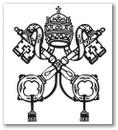One of the benefits of following the liturgical calendar is that you continue to celebrate Christmas long after December 25th has come and gone. When I was growing up and prior to my having any knowledge of the liturgical calendar, I had a sense that Christmas should continue to be celebrated for a while, not just for one day. However, without a framework for supporting that idea, there is little support for actually continuing to think about Christmas in the days that follow the actual day.
In the spirit of recognizing the liturgical season of Christmas, this year, my wife and I have decided to postpone our own gift exchange to one another until January 6th which is the traditional feast day of the Epiphany*. It is also the day that the Orthodox Churches celebrate Christmas. It is of course fitting to consider this a day to emulate the magi by giving gifts. On this feast of the Epiphany, the Church celebrates that the Word made flesh was first revealed to the Gentiles when the magi came to worship Him offering their gifts of gold, frankincense, and myrrh.
I also like the tradition associated with the feast of Epiphany on which the home is blessed. Part of this tradition includes inscribing with chalk the year and the initials of the three magi above the doors on the outside of your house. This year, the chalk will be used to make the following marking above the door:
20 + C + M + B + 06
I remember seeing that marking above doors when I was in Europe, but I did not know what it meant. I learned later that letters "C", "M", and "B" represent two things. First, they are the traditional names of the three magi: Caspar, Melchior, and Balthasar. In addition, the initials can be an abbreviation for the Latin phrase
Christus mansionem benedicat which means "Christ bless this house". In general, when I see that above a door, I think that Christ has been welcomed into that home because the family that lives there has made room for Him. It is my prayer for my family that when we see the inscription above our door we will be reminded to make room for Christ in our home and in our hearts. In addition to the inscription, the blessing of the house includes asking for God's blessing upon the house and the family goes from room to room in the house sprinkling each room with Holy water.
For the past several years, we have celebrated this tradition. It is something which I look forward to in part because it fulfills that sense I had when I was growing up that Christmas is more than just one day. Instead, through the liturgical calendar, we get to enjoy a much longer Christmas celebration.
For more information on Epiphany traditions go to
Catholic Culture.
*In the United States, the feast day is moved to the following Sunday which is January 8, 2005.
Posted by David at
10:27 AM
|
Comments (1)
|
Link


General - That the effort to bring about the full communion of Christians may foster reconciliation and peace among all the peoples of the earth.
We can say it: the funeral of John Paul II was a truly extraordinary experience in which was perceived in some way the power of God Who, through His Church, wishes to form a great family of all peoples, through the unifying force of Truth and Love. In the hour of death, conformed to his Master and Lord, John Paul II crowned his long and fruitful pontificate, confirming the Christian people in faith, gathering them around him and making the entire human family feel more united. …. Nourished and sustained by the Eucharist, Catholics cannot but feel stimulated to tend towards that full unity for which Christ hoped in the Cenacle. Peter’s Successor knows that he must take on this supreme desire of the Divine Master in a particularly special way. To him, indeed, has been entrusted the duty of strengthening his brethren. Thus, in full awareness and at the beginning of his ministry in the Church of Rome that Peter bathed with his blood, the current Successor assumes as his primary commitment that of working tirelessly towards the reconstitution of the full and visible unity of all Christ’s followers. This is his ambition, this is his compelling duty. He is aware that to do so, expressions of good feelings are not enough. Concrete gestures are required to penetrate souls and move consciences, encouraging everyone to that interior conversion which is the basis for all progress on the road of ecumenism.Source
Missionary - That Christians may know how to welcome migrants with respect and charity, seeing in each person the image of God.
Jesus specifically mentions the “stranger.” He began His earthy life as a stranger, as a migrant and refugee. He knew firsthand the sufferings of those who, for whatever reason, must leave their homes to find the necessities of life and freedom from the threat of death. May we and all Christians see in every migrant the image of God and Jesus Himself begging for our welcome and care. May we show migrants the respect and charity that will lead Jesus to some day say to us: "Come, you who are blessed by my Father. Inherit the kingdom prepared for you from the foundation of the world. For I was hungry and you gave me food, I was thirsty and you gave me drink, a stranger and you welcomed me, naked and you clothed me, ill and you cared for me, in prison and you visited me."Source
That more Americans may understand how extreme is the policy that Roe v. Wade imposed.

Posted by David at
10:04 PM
|
Comments (0)
|
Link










